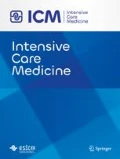Abstract
Objective
Biomarkers allowing accurate early staging of septic shock patients are lacking despite their obvious interest for patient management. Experimental models of septic shock in mouse previously noted a decrease in dendritic cell numbers. The aim of the study was to find a rapid reproducible biological test for an assessment of disease severity.
Design
Evaluation of peripheral blood dendritic cell counts by flow cytometry using three commercially available kits.
Patients and participants
Forty-two consecutive septic shock patients were studied prospectively.
Measurements and results
Early low dendritic cell counts were correlated to disease severity as assessed by Simplified Acute Physiology Score or Sequential Organ Failure Assessment and predicted fatal outcome. The correlation was still present when the results were adjusted for age.
Conclusion
The monitoring of blood dendritic cell count may provide an early and valuable assessment of the severity of the host response against infection and may influence the therapeutic management of septic shock patients.


References
Angus DC, Linde-Zwirble WT, Lidicker J, Clermont G, Carcillo J, Pinsky MR (2001) Epidemiology of severe sepsis in the United States: analysis of incidence, outcome, and associated costs of care. Crit Care Med 29:1303–1310
Angus DC, Wax RS (2001) Epidemiology of sepsis: an update. Crit Care Med 29:S109–S116
Hotchkiss RS, Karl IE (2003) The pathophysiology and treatment of sepsis. N Engl J Med 348:138–150
Banchereau J, Steinman RM (1998) Dendritic cells and the control of immunity. Nature 392:245–252
Zou W (2005) Immunosuppressive networks in the tumour environment and their therapeutic relevance. Nat Rev Cancer 5:263–274
Blanco P, Palucka AK, Gill M, Pascual V, Banchereau J (2001) Induction of dendritic cell differentiation by IFN-alpha in systemic lupus erythematosus. Science 294:1540–1543
Pulendran B, Palucka K, Banchereau J (2001) Sensing pathogens and tuning immune responses. Science 293:253–256
Efron PA, Martins A, Minnich D, Tinsley K, Ungaro R, Bahjat FR, Hotchkiss R, Clare-Salzler M, Moldawer LL (2004) Characterization of the systemic loss of dendritic cells in murine lymph nodes during polymicrobial sepsis. J Immunol 173:3035–3043
Hotchkiss RS, Tinsley KW, Swanson PE, Grayson MH, Osborne DF, Wagner TH, Cobb JP, Coopersmith C, Karl IE (2002) Depletion of dendritic cells, but not macrophages, in patients with sepsis. J Immunol 168:2493–2500
Tinsley KW, Grayson MH, Swanson PE, Drewry AM, Chang KC, Karl IE, Hotchkiss RS (2003) Sepsis induces apoptosis and profound depletion of splenic interdigitating and follicular dendritic cells. J Immunol 171:909–914
Riedemann NC, Guo RF, Ward PA (2003) Novel strategies for the treatment of sepsis. Nat Med 9:517–524
Wysocka M, Montaner LJ, Karp CL (2005) Flt3 ligand treatment reverses endotoxin tolerance-related immunoparalysis. J Immunol 174:7398–7402
Acknowledgements
We are indebted to N. Berrié, J.C. Carron, M. Garcie, F. Saussais and to all members of the laboratory of clinical Immunology at the Centre Hospitalier Régional de Bordeaux, who skillfully contributed to this study. We thank the Société de Réanimation de Langue Française for its financial support.
Author information
Authors and Affiliations
Corresponding author
Additional information
O. Guisset and M.-S. Dilhuydy contributed equally to this work.
Rights and permissions
About this article
Cite this article
Guisset, O., Dilhuydy, MS., Thiébaut, R. et al. Decrease in circulating dendritic cells predicts fatal outcome in septic shock. Intensive Care Med 33, 148–152 (2007). https://doi.org/10.1007/s00134-006-0436-7
Received:
Accepted:
Published:
Issue Date:
DOI: https://doi.org/10.1007/s00134-006-0436-7

